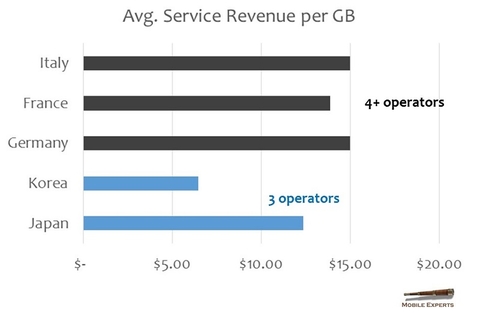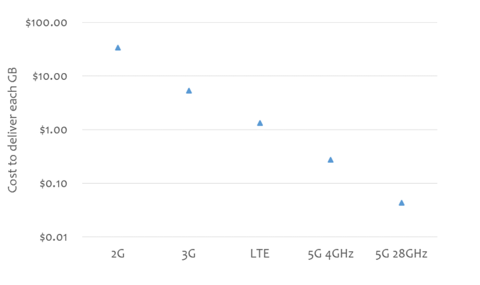In 2011, AT&T attempted to buy T-Mobile USA. The Department of Justice blocked the deal, saying that we need four mobile telecom providers to ensure adequate competition. Let’s examine that idea. Are four competitors really necessary?
Let’s look at other countries:
In Japan, Korea, and China, each country has three major mobile operators, and all three operators are fairly healthy financially. The average revenue per user (ARPU) is about $42 in Japan and $31 in Korea. These are the countries that will start deploying nationwide 5G networks in 2019-2020, because they collect enough money to justify a 5G network.
In Europe, greater competition has resulted in lower ARPU. Germany, France, Spain and Italy have four operators and their ARPU numbers come in around $15 to $20. For these countries, we are not forecasting nationwide 5G networks anytime in the next five years because they don’t generate enough revenue to make it worthwhile.
So, the principle of “more competition drives lower prices” appears to be correct. But when we look below the surface, it’s not really true. Here’s why:

In Japan and Korea, the average data usage was about 4-5 GB per month as of December 2017. However, in Germany, France, and Italy, average usage was only 1-2 GB per month. So, translating from “dollars per month” into “dollars per GB” leads to a very different conclusion. Watching Katie’s kitten video costs twice as much in Germany than in Korea.
This concept will become even more obvious when 5G is launched. We’ve estimated that 5G networks will bring down the cost per GB dramatically.

Assuming that ARPU remains the same, 5G customers will get 10 times as much data for the same $40 per month. In other words, the retail price could drop from $12 per GB in Japan to about $1.20/GB. Heck, at that point many 5G subscribers will “cut the cord” and dump the broadband connection to their homes, saving another $50 per month.
By 2021, we expect the retail price per GB to be at least 5 times higher in Germany than in Korea. This will completely blow up the idea that four operators are better than three.
Tech markets are not a good place to apply “textbook” antitrust solutions. The “textbook” was written around things like oil and steel, where technology changes very slowly. In the telecom market, next-generation technology does a lot more to reduce prices than any other factor. We need to encourage investment in technology, not create the appearance of competition by forcing weak companies to continue limping along.
My advice to the Department of Justice: Let T-Mobile and Sprint get married. Their children will be capable of things that we can’t do today.
Joe Madden is principal analyst at Mobile Experts, a network of market and technology experts that analyze wireless markets. The team provides detailed research on Small Cell, Base Station, Carrier Wi-Fi, and IoT markets. Mr. Madden currently focuses on trends in 5G, IoT, and Enterprise markets for wireless infrastructure. Over 26 years in mobile communications, he accurately predicted the rise of Digital Predistortion, Remote Radio Heads, Small Cells, and the rise of a Mobile IT market. He validates his ideas with mobile and cable operators, as well as semiconductor suppliers, to find the match between business models and technology. Mr. Madden holds a physics degree from UCLA. Despite learning about economics at Stanford, he still obeys the laws of physics.
"Industry Voices" are opinion columns written by outside contributors—often industry experts or analysts—who are invited to the conversation by Fierce staff. They do not represent the opinions of Fierce.

